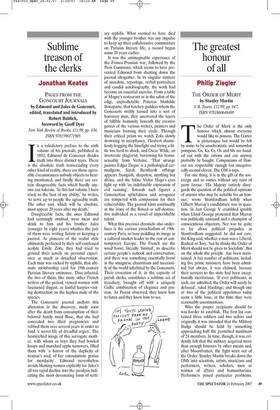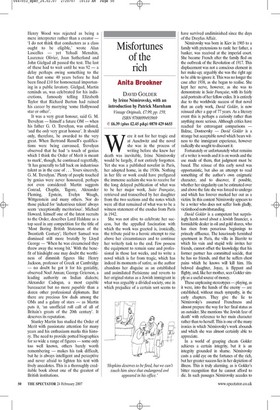The greatest honour of all
Philip Ziegler THE ORDER OF MERIT by Stanley Martin I. B. Tauris, £12.99, pp. 647, ISBN 9781860648489 The Order of Merit is the only honour which almost everyone would like to possess. The Garter is picturesque but would be felt by some to be anachronistic and somewhat pompous. Gs, Ks, Cs, Os and Ms are handed out with the rations and can anyway probably be bought. Companions of Honour are respectable enough but unequivocally second eleven. The OM is tops.
For one thing, it is in the gift of the sovereign and so comes without any taint of party favour. 'His Majesty entirely disregards the question of the political opinions of anyone who may be suitable for an honour,' wrote Stamfordham loftily when Gilbert Murray's candidature was in question. In fact George V crumbled ignobly when Lloyd George protested that Murray was politically unsound and a champion of conscientious objectors. Nor was he quite so far above political prejudice as Stamfordham suggested: he did not care, the King said, whether a man was a Liberal, Radical or Tory, 'but he thinks the Order of Merit should not be given to Socialists'. But on the whole the priciple has been maintained. A fair number of politicans, including five prime ministers, have been admitted but always, it was claimed, because their services to the state had been exceptionally meritorious. 'If ever politicans, as such, are admitted, the Order will surely be debased', ruled Hardinge; and though one or two of the political appointees today seem a little base, at the time they were reasonably uncontentious.
Who the proper recipients should be was harder to establish. The first list contained three soldiers and two sailors and originally it was intended that the Military Badge should be held by something approaching half the permitted maximum of 24 members. In time, though, it was evidently felt that the military acquired more than enough honours by other means and, after Mountbatten, the fight went out of the Order. Stanley Martin breaks down the OMs into scientists, artists, musicians and performers, writers, scholars, men or women of affairs and humanitarians. Performers posed particular problems.
Henry Wood was rejected as being a mere interpreter rather than a creator 'I do not think that conductors as a class ought to be eligible,' wrote Alan Lascelles — yet Yehudi Menuhin, Laurence Olivier, Joan Sutherland and John Gielgud all passed the test. The last of these had to wait until he was 92 — a delay perhaps owing something to the fact that some 40 years before he had been fined £10 for homosexual importuning in a public lavatory. Gielgud, Martin reminds us, was celebrated for his indiscretions, famously telling Elizabeth Taylor that Richard Burton had ruined his career by marrying 'some Hollywood star or other'.
It was a very great honour, said G. M. Trevelyan — himself a future OM — when his father G. 0. Trevelyan, was enlisted, 'and the only very great honour'. It should only, therefore, be awarded to the very great. When Bertrand Russell's qualifications were being canvassed, Trevelyan observed that he had 'a touch of genius which I think the Order of Merit is meant to mark', though, he continued regretfully, 'It has generally to fall back on industrious talent as in the case of. . . Yours sincerely, G. M. Trevelyan.' Plenty of people touched by genius were never honoured, perhaps not even considered: Martin suggests Conrad, Chaplin, Tagore, Alexander Fleming, Epstein, Evelyn Waugh, Wittgenstein and many others. Nor do those picked for 'industrious talent' always seem 'exceptionally meritorious'. Michael Howard, himself one of the latest recruits to the Order, describes Lord Haldane as a top seed in any competition for the title of 'Most Boring British Statesman of the Twentieth Century'; Herbert Samuel was dismissed still more brutally by Lloyd George — 'When he was circumcised they threw away the wrong bit.' With the benefit of hindsight one may doubt the worthiness of dimmish figures like Henry Jackson, professor of Greek at Cambridge — no doubt he got it for his geniality, observed Noel Annan; George Grierson, a leading authority on Indian dialects; Alexander Cadogan, a most capable bureaucrat but no more papabile than a dozen other professional diplomats. But there are precious few duds among the OMs and a galaxy of stars — as Martin puts it, 'an unofficial roll call of all of Britain's greats of the 20th century'. It deserves its reputation.
Stanley Martin has studied the Order of Merit with passionate attention for many years and his enthusiasm marks this history. The need to provide potted biographies for so wide a range of figures — some only too well known, others barely worth remembering — makes his task difficult, but he is always intelligent and perceptive and never afraid to lighten his text with lively anecdotes. This is a thoroughly creditable book about one of the greatest of British institutions.























































 Previous page
Previous page